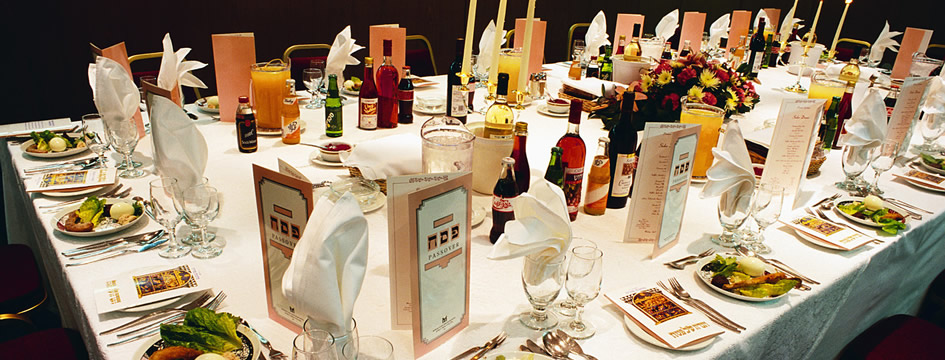
Is this an authentic picture of what the Rabbis really had in mind when they instituted an evening with family and friends designed to nostalgically recall the miracle of leaving Egypt and our journey to freedom? I think not!
It is abundantly clear from countless sources that the purpose of the evening is not simply to ramble through the text of the Haggadah, or to compete for who has the most to say. The entire format of the Seder supports the goal of the evening, which is, at its core, to simply have a conversation.
Indeed, Rav Chaim Soloveitchik suggests that this format is what differentiates the mitzvah to speak about Yetzias Mitzrayim (the exodus) on Seder night, from the mitzvah to remember it every single day. The rest of the year we lecture, teach, and tell Divrei Torah about leaving Egypt. Seder night, we have a conversation about the experience in the form of questions and answers, give and take, dialogue and discussion. Indeed, so many of the peculiar practices of the evening are done just so that the children will be curious, ask and ignite a conversation.
I would like to offer a bold suggestion – consider asking your children to put away their Haggadahs for part of the Seder. The teachers of our community do an extraordinary job in preparing our students. The creativity, ingenuity and hard work that goes into designing the beautiful, personalized Haggadahs, and filling them with Torah thoughts is a testament to the dedication of our outstanding Rebbeim, Morahs, and teachers. We should welcome their incredible Haggadahs at our Seder table, but in moderation. If not, these Haggadahs can become a source of distraction and even worse, a source of friction when each of our children feel an obligation to read every single thought on every single page of their Haggadah at the Seder.
Of course, we should spend time sitting with each child, looking through their Haggadah, listening to their Divrei Torah, and appreciating their enthusiasm. Perhaps we can dedicate time on Erev Pesach or on Yom Tov afternoon to look at their Haggadahs more in depth and to hear the thoughts that didn’t make it into the Seder itself. But, if we want our children to get the most out of our Seder experience, it can’t just be a presentation of what they learned in school.
The Seder must be a time to have conversations that matter and discussions that can be transformative and provide inspiration that lasts the entire year. These conversations can happen with children and adults of all ages. Young kids should be engaged in storytelling in a real and personal way.
We must turn to our children and grandchildren and tell them the riveting story of how we used to be slaves, do backbreaking labor, and then we were freed through miracles. With older children and adults, the conversations should be more sophisticated. I would like to suggest a few examples of how the Seder can be a platform for great conversations.
Here are some thought-provoking questions that you can share Seder night to generate the kind of rigorous and robust discussions that our Rabbis imagined us having:
- Ha Lachma Anya: Why do we begin the Seder specifically by inviting the underprivileged to join us? Is there a connection between freedom and sharing with others?
- Avadim Hayinu: What is slavery and what is freedom? Though we are physically free, are there things and behaviors we are enslaved to? Does technology give us greater freedom or enslave us?
- Four sons: Which child do you identify with? Is the Rasha really so wicked if at least he comes to the Seder? What about the hypothetical 5th son who doesn’t even show? Are the eino yodei’ah lish’ol (don’t know how to ask) the unaffiliated of our generation, and how do we engage them?
- V’hi she’amdah: Who are the enemies of our generation that seek to destroy us, and can we identify miracles Hashem does to protect us? What is the root of Anti-Semitism and why have we always had enemies that seek our destruction?
- Arami Oveid Ami: We became a nation when living among the Egyptians. Is living in a land of freedom good or bad for Judaism? Has the freedom of this great country, America, contributed positively or negatively to the continuity of Torah Judaism?
- Ten Plagues: Can you think of a situation where you felt stuck and Hashem bailed you out? Are there miracles in your life in which you saw the guiding hand of Hashem?
- Dayenu: What does it mean to have the capacity to say enough? Are we ever satisfied or do we always crave more?
- Hallel: What are you thankful for and why? Tell stories of personal freedom and liberation.
These are just a few examples, but there are countless more conversations to be had on Seder night. Even if you disregard my earlier suggestion and insist on listening to every single Dvar Torah your child brings home, I urge you to be sure to make time to tell stories, ask questions and have critical conversations.
When all is said and done, the Seder is intended to be an exercise in emunah (faith). If we walk away from the Seder and we have not grown in seeing Hashem in our lives and feeling a connection and closeness to Him, we have failed in our mission. Make sure to have the kind of Seder that will leave friends and family wanting to come back for more of your good food and great company, but most of all for your incredible and inspiring conversations.